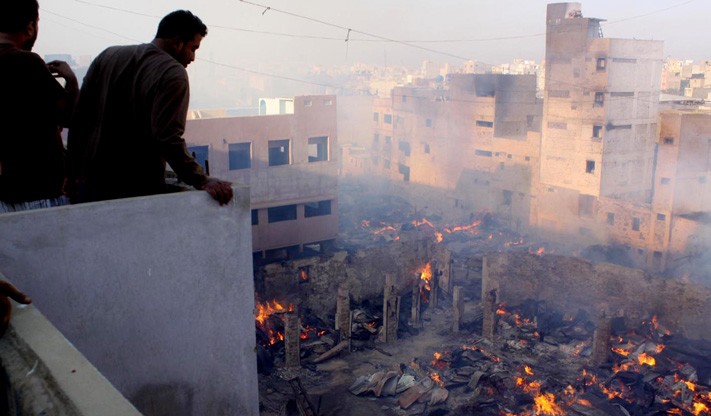
The Karachi and Lahore fires should serve as the final reminders to plan and implement measures ensuring workplace safety

Two ghastly calamities hit the country during the last days of December 2014. Fires in timber market in Karachi caused loss of millions of rupees, besides the agony to hundreds of affected households and businesses. 13precious lives were lost in the Anarkali Bazaar blaze which also left dozens seriously injured.
As per administrative norms, we received stereotypical reports about the causes of the fire though no valid finding about the actual causes has been revealed. Experiences inform that poor wiring, lack of internal security measures, shoddy construction or absence of proper fire escape routes may have led to this avoidable cataclysm. But these are not isolated happenings.
A few months ago, hutment fire in Karachi caused many casualties. In the aftermath, the conventional actions took their course including announcement of monetary compensation and orders of inquiry. Such incidents and related issues need a far sighted approach and permanent solution as they directly impact the safety and security of human life, especially the poor and working classes.
Disasters like the recent shopping plaza or market blazes are caused by many reasons. Unsafe methods of installing generators or backup power supply system is one cause. Acts of mischief and crime cannot be ruled out, though scientific inquiry is a pre-requisite. The commercial buildings are seldom repaired for various electrical and plumbing defects that they progressively develop. Since the owners and managers are only interested to spend minimum to optimize the returns, tenants are asked to continue without addressing faults such as leakages, sparks in wiring or malfunctioning of worn out conduits.
Many premises -- established in commercial or residential areas -- do not even bother to acquire power connections commensurate with actual load of consumption. Similarly, layouts and placement of work stations do not guarantee safe evacuation. Few exits to the exteriors cause danger of stampede and trap situations. Lack of ventilation and inappropriate orientation render such structures suffocating and dingy.
Garment factories, mechanical, embroidery outlets, stitching shops of various scales and profiles abound in New Karachi, North Karachi, Orangi, Korangi, Landhi, Malir, Old Town and many other locations in the city that can face similar hazards as a possible accident.
The Karachi and Lahore fires should serve as the final reminders to plan and implement measures ensuring workplace safety. The foremost task is to update the information and data pertinent to production, retail and warehousing spaces. The federal and provincial bureau of statistics has several surveys already done in the past which can serve as the baseline. A municipal project may be formulated to update and enhance this data base. Building information parameters, especially related to human safety must be included. Existing building bylaws and regulations in various places may be revisited for initial scale application. Most of them have provisions for safety which only needs to be effectively applied.
The Karachi Building and Town Planning Regulations 2002 -- which is the key applicable statute in this regard and also revised from time to time -- has many useful provisions. Appropriate provision of stand pipes; automatic sprinkler system; manual fire extinguishing equipment; fire alarm system; signal stations; dimensions of overhead water tanks; structural provisions for fire resistant construction; separating/fire walls; protected shafts; fire resistant doors and several other relevant provisions are included in the document. They await strict implementation.
A checklist based evaluation of existing building stock can help identify the inappropriately constructed buildings for the purpose of retrofitting. Few specialised teams can be mobilised to design and facilitate these tasks on an emergency basis. However cooperation from all the stakeholders is a pre-requisite in this respect. Trade and commerce bodies, political parties, building control authorities, labour unions, technical universities and media shall have to work together to approach this vital objective.
Diverse and complex urban regions such as Karachi and Lahore have many typologies of building stocks which need safety and security audits through collaborative administrative agencies, professionals and even ordinary people. Warehousing and basic manufacturing activities in old town quarters along railway lines, high tension wires, highways, busy urban roads, manufacturing units, godowns of hazardous items, petroleum installations, oil depots, power stations, nullah banks and garbage dumps are some of the sites where people can be found living in a fairly organised but dangerous manner. The labourers of various ranks and profiles can be spotted sleeping on the push carts, foot paths, shop fronts, curb sides, parks, traffic, islands/medians, edges of the boundary walls and under flyovers could all become targets of hazards of similar proportions.
In the public sector, the Civil Defence Department has become near moribund. It had many important roles to play that comprised training at various levels, preparation drills, maintenance and operation of a basic warning system and proper record keeping of its outposts. It needs a renaissance. National bodies such as Disaster Management Authorities with hefty budgets must be asked to assist in its revamping and up-scaling.
A fire safety survey may be conducted in locations where fire complaints and hazards have been registered on a recurring basis. Causes of fire and combating capabilities, route planning for hazards, emergency reservoirs of water and mapping of storages of inflammable materials could be few of the starting variables.
Fire departments must be bolstered by adding hardware, rescue equipment and hindrance free access to hydrants. Safety of ordinary folks is the prime determinant of the performance of various tiers of administration. It is sincerely hoped that these incident will be the last of their kind and scale!